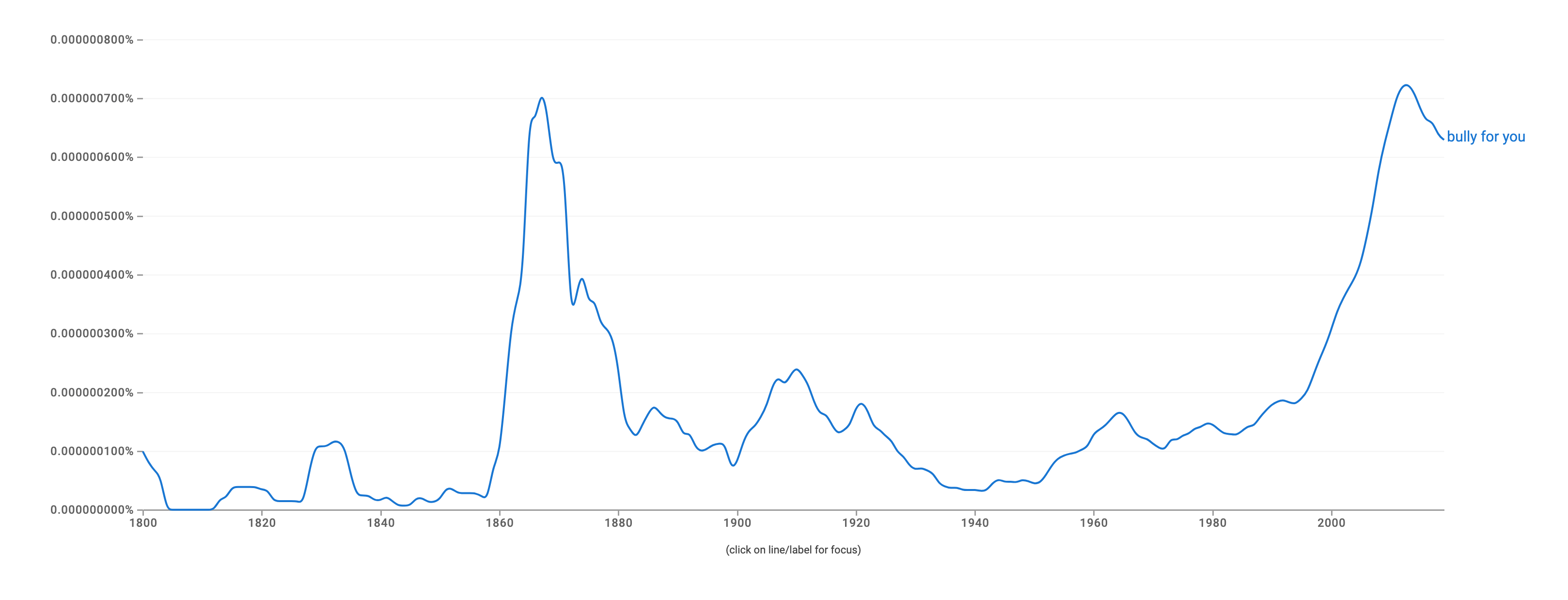- "Bully for you" is an idiomatic expression that can convey either genuine congratulations or sarcastic acknowledgment, depending on the context and tone, expressing approval or irony towards someone's achievement or good fortune.
👏 "You finished the project ahead of schedule? Bully for you! Your efficiency is truly commendable."
In this sentence, "Bully for you!" is an expression of genuine congratulations and admiration for the person who finished the project ahead of schedule. It signifies approval and acknowledges the individual's commendable efficiency.
"Bully for you!" - a curious expression, isn't it? Two little words packed with a surprising amount of nuance. It can be a sincere cheer, a sarcastic pat on the back, or something in between. So, let's dive into the fascinating world of "bully for you" and explore its many layers of meaning.
When to use "bully for you"
"Bully for you!" can be a tricky phrase, as its meaning can vary depending on context and tone. Here are some tips on when to use it safely and effectively:
When it's a clear win: If someone has achieved something genuinely impressive and you want to express your sincere congratulations, "bully for you!" can be a great choice. Think winning a big award, landing their dream job, or overcoming a major challenge. A warm delivery and genuine enthusiasm will ensure your words are interpreted as true celebration.
When playful banter is appropriate: With close friends or in situations where playful teasing is the norm, a sarcastic "bully for you" can be fun and lighthearted. Just make sure the context is clear and your friend knows you're just messing around. A playful nudge or wink can help clarify your tone.
When to tread carefully: Avoid using "bully for you" in formal settings or with people you don't know well. The sarcasm can be easily misinterpreted as insincere or even condescending. Stick to straightforward congratulations like "That's fantastic!" or "Congratulations on your success!"
Always consider the context: Think about the relationship you have with the person, the situation at hand, and the potential for your words to be misunderstood. If you're unsure, it's always best to err on the side of caution and choose a more neutral way to express your congratulations.
Example sentences
Sincere Congratulations:
- Bully for you on winning the scholarship! Your hard work really paid off.
- Finally getting published! Bully for you, that's so exciting!
- You aced that presentation! Bully for you, I knew you could do it.
Playful Teasing:
- Oh, you got the promotion? Bully for you, maybe you'll finally buy me lunch now.
- Finished that marathon? Bully for you, now let's see you beat my pizza-eating record.
- Got the last slice of cake? Bully for you, but prepare for tickle warfare!
Sarcastic or Condescending:
- Bully for you, finally learned how to tie your shoes.
- Oh, you managed to spell 'congratulations' correctly? Bully for you.
- Bully for you, winning over the boss with your 'charm.' I just used competence.
Examples from the web
"'I would say bully for you, get the best deal you can,' she said." - The New York Times
"They know the kind of poet who's going to win, and if you happen to fit the slot, then bully for you!" - The New Yorker

Examining the graph below, we can see that the phrase "bully for you" had two peaks: one in the 1870s, and the other in the 2000s.
Other than those two peaks, the phrase "bully for you" was used in low numbers.

Synonyms/Related Phrases
- Formal: "Congratulations on your well-deserved success!"
- Informal: "That's awesome! Way to go!"
- Enthusiastic: "You did it! I'm so proud of you!"
- Humorous: "I don't know what's more impressive, your achievement or the fact that I'm not jealous...much." (Only use with close friends!)
FAQ
Why did people say bully?
The word "bully" has undergone a fascinating evolution in its meanings and usage over the centuries. Originally, in the 16th century, "bully" was a term of endearment or camaraderie among men. However, by the 17th century, it had shifted to signify a swaggering or blustering individual, often associated with aggressive behavior.
In the 18th and 19th centuries, "bully" took on additional meanings, such as a term for a hired henchman or someone who uses their strength to intimidate. It was during this time that the expression "bully for you" emerged, expressing approval or admiration for someone's achievements.
In modern times, the term "bully" has primarily adopted a negative connotation, referring to someone who habitually seeks to harm or intimidate others, especially weaker individuals. The evolution of "bully" showcases how language can transform, reflecting shifts in societal attitudes and values over time.
Why do British say bully?
The British use the term "bully" with historical nuances. Originally a term of camaraderie in the 16th century, it evolved to describe aggressive individuals. The phrase "bully for you" emerged, expressing approval. However, contemporary usage primarily associates "bully" with negative behavior and intimidation.
Summary
"Bully for you" is more than just a phrase; it's a linguistic gem that reflects the ever-evolving nature of language. Its historical roots, literal and figurative meanings, and cultural references contribute to its enduring charm. So, the next time you encounter this expression, appreciate its versatility and use it wisely in your linguistic repertoire. Bully for you for delving into the delightful world of language quirks!

Want to sound like a native speaker?
Engram’s AI-powered grammar checker makes your English sound like a native speaker’s, suggesting natural English expressions on top of fixing grammar, spelling, punctuation, word order, and vocabulary.

References:














